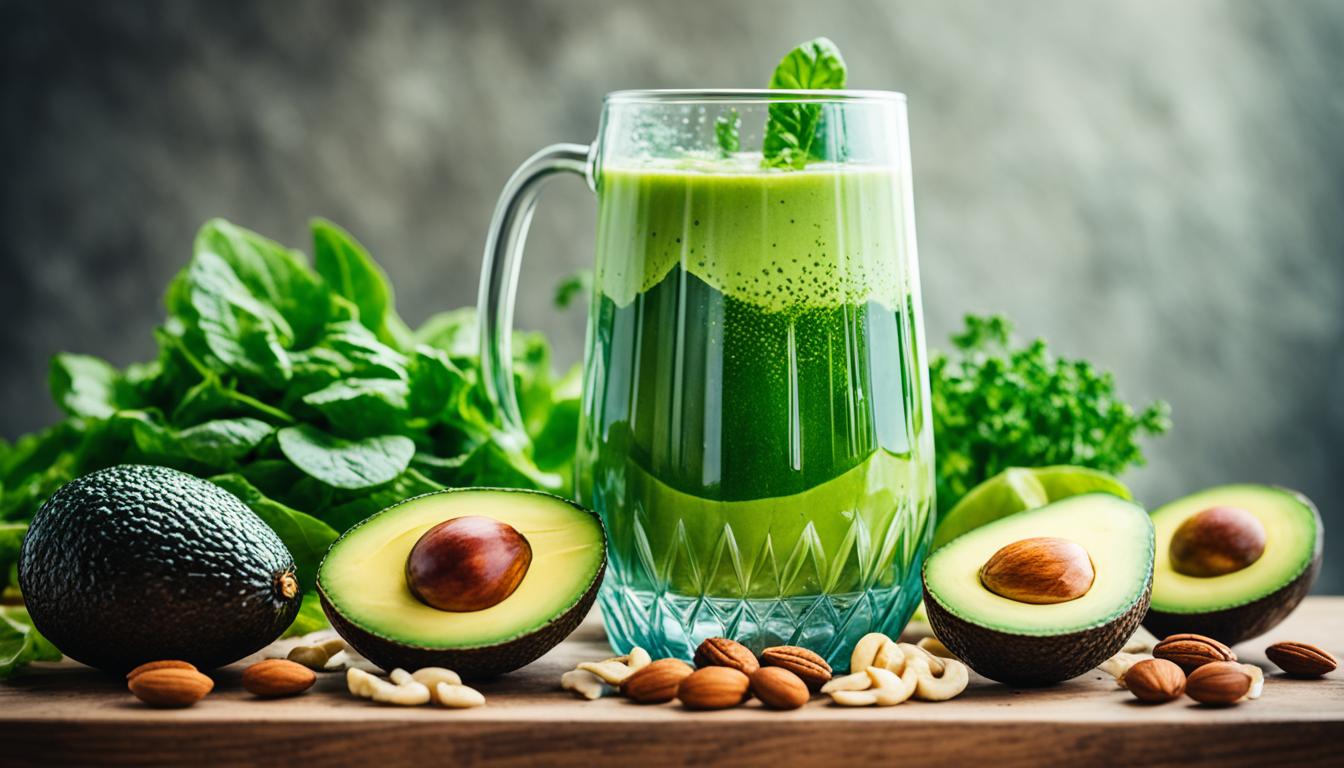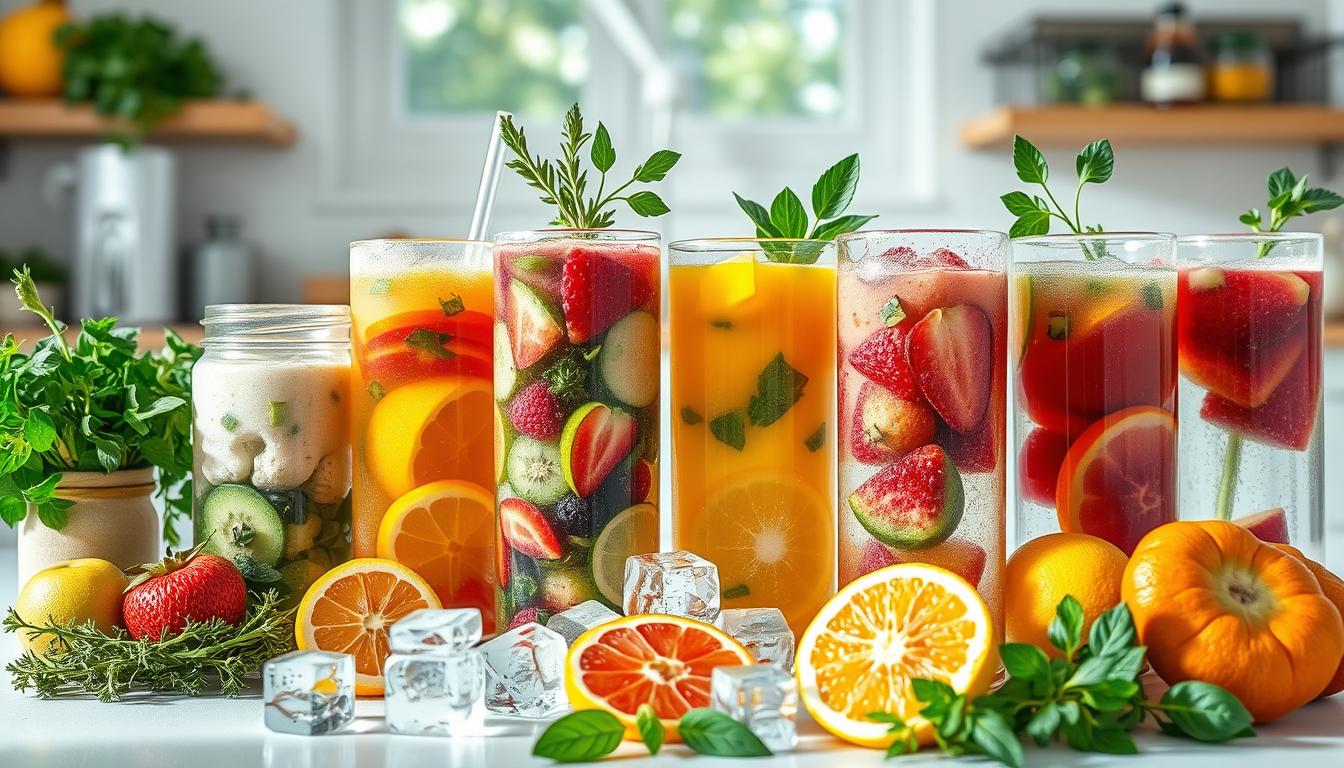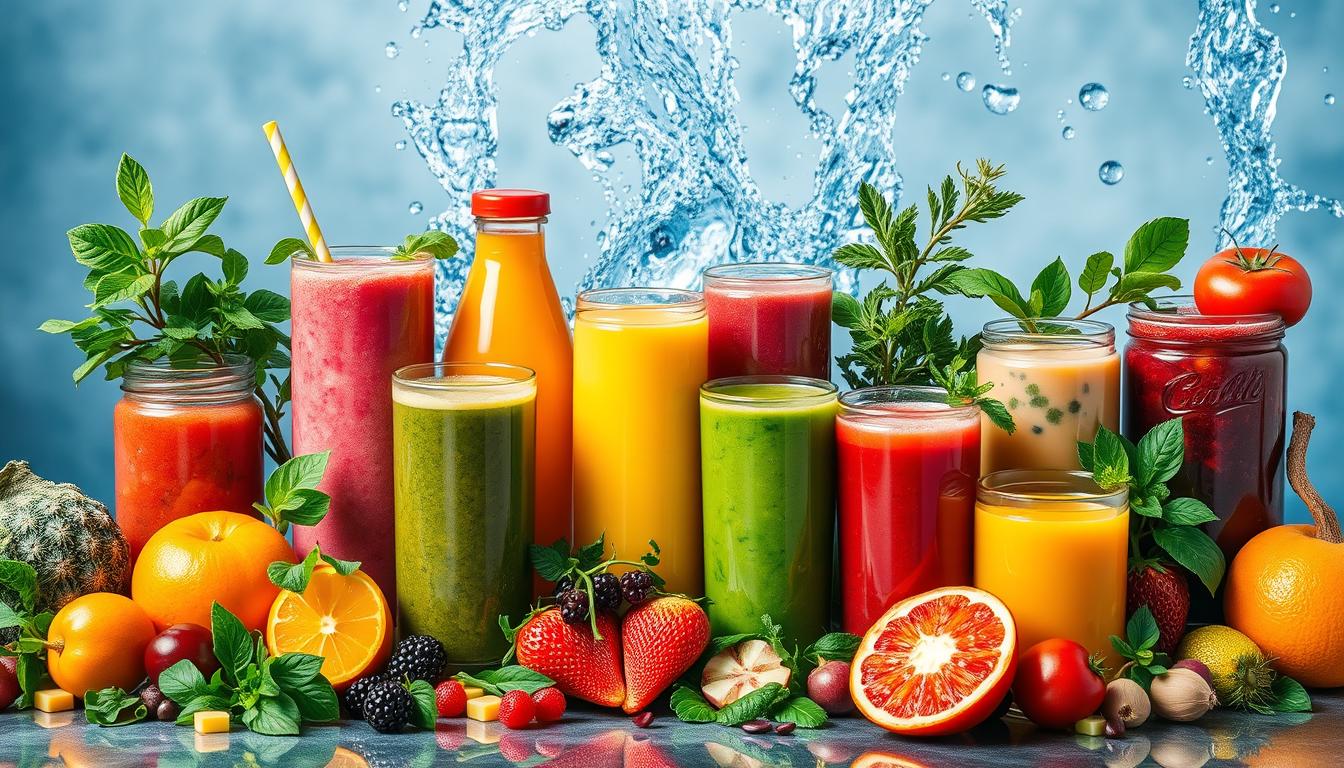The keto diet has been popular since the 1990s. It’s a way of eating that’s high in fat and low in carbs. It aims to put your body in a state called ketosis. This is where your body uses fat for energy instead of carbs. While studies show it’s good for losing weight, remember that drinking enough water is super important for your health on this diet1.
Hydration is key for everyone, but even more so on the keto diet. When you eat fewer carbs, your body doesn’t hold onto water as well. This makes it very important to drink enough. Not getting enough water can make the beginning of the diet hard. But, drinking lots of water helps with these tough times and keeps your body running smoothly1.
The National Library of Medicine says adults should drink between 2.7 to 3.7 liters of water daily. The amount you really need can change based on your age, how much you weigh, how active you are, and what you eat1. For those doing keto, a simple trick is to drink water equal to half your body weight in ounces each day. For example, if you weigh 160 pounds, you should aim for 80 ounces of water every day1.
For the keto diet to work well, staying hydrated is very important. This is because your body loses water as it turns fat into energy. Not drinking enough water can lead to dehydration. This can cause problems like muscle cramps, feeling weak, a fast heartbeat, tiredness, and stomach upset. It could also make you feel moody and sluggish. So, drinking enough water and using electrolyte drinks like DripDrop can help a lot. DripDrop has more electrolytes and less sugar than many sports drinks. This helps keto dieters stay hydrated and reach their weight loss goals1.
Key Takeaways
- Proper hydration is essential for the success of the keto diet and overall health
- The keto diet can lead to increased water loss, making it crucial to monitor fluid intake
- Adults should aim to drink 2.7 to 3.7 liters of water per day, with individual needs varying based on factors like age, weight, and activity level
- Dehydration can cause various symptoms, such as muscle cramps, fatigue, and irritability
- Incorporating electrolyte drinks like DripDrop can help maintain optimal hydration levels while on the keto diet
The Importance of Hydration on the Keto Diet
The keto diet has been a big hit since the 90s1 for its weight loss benefits. However, it’s important to keep hydrated while on this diet1. This is because diets low in carbs, like keto, tend to make the body hold less water1. Plus, the way the diet is structured might lower your risk of dehydration from less salt1.
How the Keto Diet Affects Water Retention
The keto diet cuts back on salt, which makes you hold less water2. This is good for kicking off weight loss, as less water weight is stored2. The immediate drop in weight on keto often comes from losing stored water because of eating fewer carbs2.
The Role of Electrolytes in Keto Hydration
Electrolytes, which include sodium, potassium, and others, are key for staying hydrated on keto23. Since not all keto foods are rich in electrolytes, you might fall short. Adding magnesium and potassium supplements can help keep these levels balanced and avoid dehydration3.
Keto lowers insulin and makes you lose more sodium, essential for many body functions1. So, it’s crucial to get enough electrolytes. Doing so can prevent or ease symptoms like tiredness, cramps, and headaches2. You can use DripDrop’s electrolyte supplements since they have less sugar than other drinks1.
| Electrolyte | Function | Keto-Friendly Sources |
|---|---|---|
| Sodium | Fluid balance, nerve function | Salt, broth, pickles |
| Potassium | Muscle and heart function | Avocado, spinach, mushrooms |
| Magnesium | Energy production, bone health | Nuts, seeds, dark chocolate |
| Calcium | Bone strength, muscle contraction | Cheese, sardines, kale |
Keeping hydrated on keto is a must to avoid dehydration1. Dehydration can cause unpleasant symptoms like muscle cramps and a rapid heartbeat1. By managing your electrolyte levels and focusing on water-friendly foods, you can stay well-hydrated. This way, you’ll benefit most from the keto lifestyle.
Signs and Symptoms of Dehydration on Keto
Dehydration is quite common for those on the keto diet4. This happens because the body starts using up stored water. It leads to an imbalance in electrolytes and sometimes, dehydration3. It’s vital to know the signs of dehydration on keto. This way, you can stay hydrated for better health.
Headaches and Dizziness
One big sign of dehydration on keto is getting headaches and feeling dizzy. When you’re short on fluids, your brain can shrink a little inside your head. This causes headaches4. If you’re not getting enough electrolytes, it can also bring on headaches and even migraines4.
Fatigue and Lethargy
Dehydration can set off a slump in energy and motivation. Your body might feel weak, get cramps, or your heart could beat faster. All this leads to an overwhelming sense of tiredness, sickness, and crankiness4. It might then progress to feeling foggy, dizzy, or even fainting. This is because your blood pressure suddenly drops due to dehydration4.
Dry Mouth and Thirst
Feeling thirsty and having a dry mouth is a big hint you’re dehydrated on keto. Your body creates this sensation to make you drink more water when it’s losing fluids. So, if you’re always thirsty or your mouth feels dry, you need to drink more water to stay hydrated.
Other signs of dehydration on keto include always feeling thirsty, dry eyes, being confused, brain fog, and constipation4. It’s key to watch your urine color too. Dark urine or not peeing often might mean you’re dehydrated4. To avoid this, try to drink 2-3 liters every day3. Also, add foods rich in electrolytes to your diet, like leafy greens, avocados, and nuts3.
Benefits of Staying Hydrated on the Keto Diet
Hydrating well is key for good health on the keto diet. This diet makes your body burn fat for energy. But, it also makes you lose more water, which is why drinking enough water is crucial. Here’s why being hydrated is important when doing keto:
Improved Fat Metabolism
Being well hydrated helps your body turn fat into energy more easily on the keto diet2. It aids in creating ketones, your body’s energy during this diet. Water also helps use the fat stored in your body, giving you energy even when you’re not eating. So, drinking water is vital for a successful keto journey.
Reduced Appetite and Cravings
When you’re not hydrated, you might feel hungry even when you’re not. This can lead to snacking, which isn’t good for losing weight. Signs like feeling weak or dizzy can mean you’re both dehydrated and hungry1. So, if you feel like snacking, first check if you’re drinking enough water. Try a glass of water or a keto-friendly drink instead to see if it helps.
| Keto-Friendly Beverages | Benefits |
|---|---|
| Water with Lemon or Lime | Hydrating and provides vitamin C |
| Unsweetened Tea | Contains antioxidants and aids in hydration |
| Bone Broth | Rich in electrolytes and supports gut health |
| Sparkling Water | Carbonated and can help curb cravings |
Better Kidney Function
Shifting your body’s energy source from glucose to ketones can affect your kidneys2. Ketones are more acidic, so it’s key to drink plenty of water to help your kidneys. This way, your kidneys stay healthy. And, it also makes it easier for them to do their job of getting rid of waste while dieting with keto3.
Making hydration a priority and choosing keto-friendly drinks can give you many benefits of the keto diet. From boosting how you burn fat to reducing how much you snack, water is vital for doing well on keto. It also supports your kidneys, making it even more important for your health.
How Much Water Should You Drink on Keto?
Keeping up with water is crucial on the keto diet. It fights the keto flu and boosts your health1. So, how much should you drink while living a ketogenic life? You might find the answer interesting.
Experts from the National Library of Medicine say adults should drink between 2.7 to 3.7 liters daily. But, how much each person needs varies. It depends on things like your weight and how active you are1. On a keto diet, the average should be about 64 ounces for both men and women. Men, however, might need a bit more, about 5 glasses extra each day5.
One way to remember how much water to drink is very simple. Just drink half your body weight in ounces of water every day. But, the keto diet changes your body’s fluids. So, you might need more to stay hydrated1. Doctors often recommend drinking an amount that’s 50% to 100% of your weight in pounds. For instance, if you weigh 160 pounds, you should have 80 to 160 ounces of water every day5.
For example, if someone weighs 160 pounds, they’ll need to take in 80 to 160 ounces of water a day while on the keto diet.
To keep hydrated and healthy while on the keto diet, add 2.5 teaspoons of salt, or 5 grams of sodium, to your daily water. This extra salt helps control electrolytes and keeps water in your body. That’s important since keto and other low-carb diets can flush out more water1.
Also, to stay well hydrated on keto, consider the following:
- Eat water-rich foods like dark green veggies, avocados, and bone broth5
- Drink electrolyte-rich drinks, keto sports drinks, or take supplements5
- Watch for signs of dehydration such as muscle cramps, fast heartbeat, weakness, dizziness, fainting, and dark urine1
| Body Weight (lbs) | Recommended Daily Water Intake (oz) |
|---|---|
| 120 | 60 – 120 |
| 160 | 80 – 160 |
| 200 | 100 – 200 |
| 240 | 120 – 240 |
By drinking enough water, you steer clear of dehydration. Plus, it helps your body burn fat into energy-rich ketones. This is key for staying in ketosis and losing weight1. So, remember to keep your water bottle close and drink up. It’s a simple step toward keto success!
Tips for Staying Hydrated on the Keto Diet
Staying hydrated is key on the keto diet for optimal health. Dehydration is a side effect because the body loses more salt and water on keto2. So, keto dieters need to drink more water than others to stay properly hydrated2. Here are practical tips to help you stay hydrated on keto:
Drink Water Throughout the Day
Aim to drink water until your urine is light yellow2. Always have a water bottle with you and sip it often. Add lemon or lime juice if plain water doesn’t appeal. Coffee and tea can also keep you hydrated2.
Eat Water-Rich Foods
Eating foods high in water content also helps keep you hydrated2. Include these keto-friendly, water-rich foods in your diet:
Broth-based soups are another great way to increase your water intake6.
Use Electrolyte Supplements
Reducing salt intake while on keto causes water loss2. To keep hydrated and maintain electrolyte balance, try electrolyte supplements. Make sure they include sodium, potassium, and magnesium2. Too much water without these minerals can cause problems.
| Electrolyte | Recommended Daily Intake | Food Sources |
|---|---|---|
| Sodium | 2,300 mg | Salt, broth, pickles |
| Potassium | 4,700 mg | Avocado, spinach, mushrooms |
| Magnesium | 320-420 mg | Nuts, seeds, dark chocolate |
By keeping track of your water and electrolyte intake, you can avoid dehydration risks on keto6. Staying hydrated is crucial for success and feeling good on your keto journey.
Conclusion
The keto diet suggests eating mostly fats and proteins while cutting way back on carbs. It promises to help lose weight and boost health overall7. But, remember there could be some downsides. One big issue is staying hydrated. When you eat fewer than 50 grams of carbs each day, your body may lose water and electrolytes78.
Staying hydrated is key. Drink plenty of water and fluids with electrolytes. Eating foods with high water content, like vegetables and avocados, can also help. Plus, you might want to use electrolyte supplements such as DripDrop to keep you feeling your best.
The keto diet may help control blood sugar and make you less hungry8. But, it’s not for everyone. Always talk to a doctor before starting. Focus on staying hydrated and watching your electrolytes to avoid negative side effects. With the right care, the keto diet can really work well for weight loss and health gains.
Source Links
- https://www.dripdrop.com/blog/health-wellness/how-much-water-should-you-drink-on-the-keto
- https://paleoleap.com/5-things-need-know-water-hydration-electrolytes-keto/
- https://www.azivmedics.com/tips-to-avoid-dehydration-on-keto-diet
- https://perfectketo.com/dehydrated-on-keto/
- https://eatpropergood.com/blogs/a-proper-good-blog/how-much-water-should-i-drink-on-keto
- https://lipseywater.com/articles/4-ideas-to-help-you-stay-hydrated-on-the-keto-diet/
- https://www.ncbi.nlm.nih.gov/books/NBK499830/
- https://nutriadmin.com/blog/keto-diet-effectiveness-as-a-weight-loss-plan/






